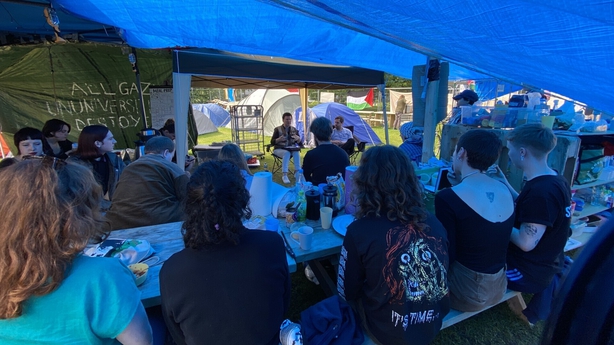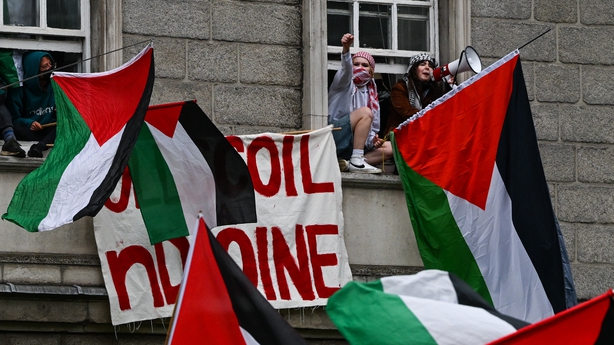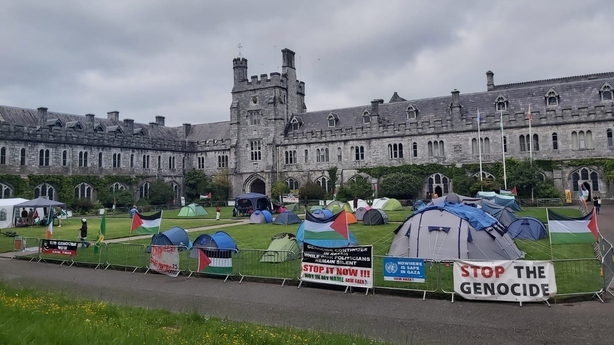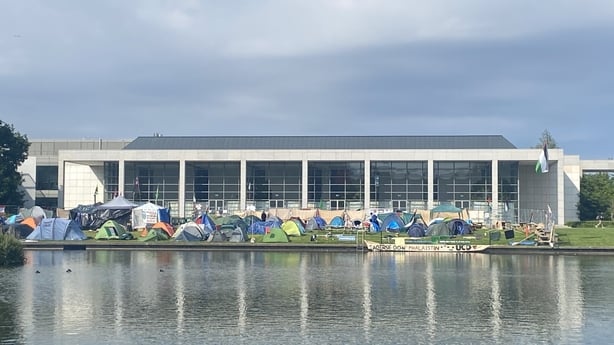On the grass by the lake at UCD yesterday afternoon around 20 students sat in the shade of stretched tarpaulins listening intently to a talk on 'the environmental politics of the Israeli occupation' given by academics Patrick Brody of UCD and Rory Rowan of Trinity College.
Other students came and went, getting or delivering items to a makeshift kitchen, while more still preferred to sit out in groups in the May sunshine.
The UCD encampment, in solidarity with the people of Palestine, is 12 days old.
The lawn between the lake and the O’Reilly Hall is covered with tents and tarpaulins and banners with slogans and Palestinian flags.
This talk was just one of a series of ‘teach-ins’ and discussions that have been taking place at this encampment and its sister encampment at UCC over the past few weeks.
The encampment notice board advertised a later session titled "Western Sahara", followed by another about Ireland, Algeria, and Palestine.
The picture is similar to the encampment in UCC’s main quad.
On Monday, speakers there led discussions on topics including ‘Traumatic stress and the role of activism as a protective factor’ and on ‘Democracy and radical democracy’.
They also discussed how Palestine is reflected in poetry.

Anyone who thinks the students on these encampments are just sitting around doing nothing is mistaken.
"It’s going well. There’s a lot of learning," UCD student Freddy from Germany told RTÉ News.
"It is great to have a space here where we can talk about these things, but there is a gap between us and the institution [UCD]", the Social Justice student said.
Referring to his formal college courses he said: "We learn all these concepts like decolonisation and racial capitalism and it's just frustrating because when it comes to applying them, no one [in the UCD leadership] dares to speak out".
The encampment is being led by UCD Students’ Union. On Friday talks between the union leadership and UCD ended without agreement.
The students have presented the college with a number of demands in relation to its policies and Palestine and Israel and SU President Martha Ní Riada says they were close to agreement on Friday on everything except the use of the word ‘genocide’.
The students want that word included in a statement but UCD refused, she said.
"It is the students who are teaching the universities how to behave."
On Monday, UCD President Orla Feely issued a statement.
"Despite very considerable effort last week, which I was hopeful would lead to resolution, it did not ultimately prove possible to reach an agreement to end the encampment," she said.
She went on to write about being "very disturbed" on Monday morning "to see widespread defacement of our campus, including messages of hatred and violence that are entirely unacceptable".
RTÉ News asked UCD for comment on last week's talks and also asked what the content of those messages was. UCD directed RTÉ News to an Irish Times article published yesterday afternoon but declined to comment further.
That article stated that Professor Feely was referring to slogans chalked on walls around the UCD campus which included "Long live the Intifada, "Zionism is terrorism", "death to Zionism" and "up the Ra".
When I put those slogans to students at the campus they strongly rejected any suggestion that such slogans were "messages of hatred and violence".
"An administration that claims such a thing doesn’t actually understand the politics and the meaning behind such slogans," one said.

The students at UCD and UCC are following the lead of students at Trinity College.
Theirs was the first encampment.
It began on 3 May and ended within days following successful engagement with the college around a list of demands. The fact that the student action led to the closure of Trinity’s lucrative Book of Kells exhibition – worth almost €17 million in revenue from visitors annually - concentrated minds.
See more: Trinity College students set up encampment over Gaza
Students at UCD and UCC have no such target, but conferring season is fast approaching and the authorities at both UCD and UCC will want to avoid at all cost the prospect of graduates posing for photos against a backdrop of tents and Palestinian flags.
UCD conferrings take place in the O’Reilly Hall. Its floor to ceiling glass windows look directly out onto the grass where the encampment is. Last week the college installed curtains across the windows.
At UCC too, the main quad where the encampment is located is the traditional backdrop to graduation pictures.
UCC’s first conferrings take place on 31 May. UCD’s begin on 6 June.
At UCC yesterday, students had their first formal engagement with the college authorities. It was an initial meeting at which the students laid out their demands.
Morgan Hegarty, of UCC's Boycott Divestment Sanctions Group, says they have three core demands.
They want UCC to issue a statement condemning Israel’s actions in Gaza including the destruction of its universities. They too want the college to call what is happening a ‘genocide’. They also want their college to cut ties with Israeli institutions and corporations and to support Palestinian students and academics who are fleeing the conflict.
The mood between the UCC students and the college administration seems more positive than that of UCD.
"They [the UCC authorities] have recognised us and the legitimacy of our encampment protest which is very welcome," Morgan Hegarty said.
"They are eager to bring an end to this."

A statement from UCC mirrors this.
"UCC is in an ongoing, direct and constructive engagement with our Students Union regarding the university's position on the conflict in Gaza," it said.
Listing a number of actions which the college has already taken, the statement concluded:
"UCC recognises and respects the right to peaceful protest and together with its students’ union, and will continue the constructive engagement on this issue."
At the encampment at UCC each day begins with an update on the current situation in Gaza. "We are here for a political reason and we are not losing sight of that," Morgan said.
He sees a strong connection between the purpose of a university and the action the students are taking.
"The ideal for a university is to teach critical thought and when to stand up, and at graduation ceremonies that is what the president talks about. But when students actually do stand up, they don't seem to welcome it as much," he said.
Completing a masters in Irish History, Morgan feels that the issue is about the college’s legacy.
"How does UCC want to be remembered? Does it want to be remembered for standing up on the right side of history or for silence in the face of genocide?" he asked.
Read more about the conflict in the Middle East
Back at UCD, one of the academics who addressed the students about Israel and sustainability says it was "a privilege" to do so.
"The aim of the teacher is to try to get the student to think critically, to help students emerge as active citizens and to understand their position in the world. How they act upon that is up to them then," Dr Rory Rowan said.
"Here, and also at Trinity, the leadership has come from the students. It is the students who are teaching the universities how to behave."
But how do other students feel about the encampments? The academic year has ended and yesterday afternoon there were very few students on campus.
On the other side of the lake two foreign EU students Juana Izquierdo and Ayat Bejas said that they didn’t know much about the details of the protest but "obviously we support free Gaza", they said.
"I probably should be more involved but I am leaving soon," Juana added.
Darragh Watters and Jamie MacNulty said they agreed with the encampment.
"The cause is right," Jamie said.
Three international students, studying Biomedical Engineering and Business also said they supported the aims of the encampment.
From the UCD lake and on towards the college’s sports facilities, RTÉ News spoke to a total of 15 students. All of them expressed support for the encampment.
A small few were not clear as to their exact aims.

"I don’t know what UCD has got to do with it," one said.
Others had strong views. A group of four male arts, humanities and social science students expressed firm support.
"I wish the college would do more to recognise what is going on. Saying what it is, is a very basic thing to do."
He explains that he means UCD needs to say the word ‘genocide’.
Referring to this week’s International Criminal Court request for arrest warrants for both the Israeli Prime Minister and the leader of Hamas, "If they are whipping out arrest warrants, it is what it is," he said.
Another in the same group, a law student named Lucas pointed to the stark difference in the UCD response to Russia when the war in Ukraine began and its response to Israel now.
In March of 2022, UCD wrote: "UCD deplores and condemns the actions of Russia in invading and attacking Ukraine. This act of military aggression is a violation of international law and is completely unjustified."
"The students in the encampment are completely valid in pointing out the discrepancy," Lucas said.
"Why is Israel getting a ‘pass’?"
In terms of a more scientific gauging of student opinion, UCD’s incoming Student Union president Miranda Bauer points to a motion expressing solidarity with Palestine that was passed by the Students’ Union council last November.
Eighty of the council’s membership supported the motion, 10 abstained, and 1 person voted against, Miranda said.
She sees this as reflective of the encampment’s mandate.
Miranda is critical of the message sent out by UCD President Orla Feely this week in which the president referred to "messages of hatred and violence".
"It’s just not true and it’s trying to pit students and the community against each other."
Referring to the slogan "death to Zionism" that was allegedly written in chalk. Miranda said: "Zionism is a political ideology. Somebody could say ‘death to fascism’, it’s about an ideology, it’s not about people."
"We have been trying to engage with UCD for many months now and we feel disappointed and disenfranchised," she said.
As the talk ended yesterday afternoon, other students arrived with dinner, two large steel catering pans with a pasta and lentil stew cooked in the nearby Students’ Union HQ.
These students are highly organised. They have supplies, and support and they say the encampments will continue for as long as it takes for their universities to hear them.







